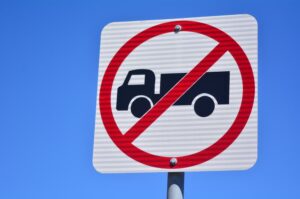All throughout the United States, the trucking industry plays a vital role in the economy, transporting a wide variety of goods across the country. However, because large commercial trucks can create such significant hazards on the roads, the Federal Motor Carrier Safety Administration (FMCSA) aims to make roads safer for everyone.
If you’re injured in a trucking collision, it’s paramount to determine the cause of your accident. In many cases, violations of trucking regulations may be to blame. When this is the case, you can use these violations to your advantage, helping establish cause and liability. A truck accident attorney is best equipped to help you with your case, as they’re intimately familiar with the necessary rules and regulations.
The Trucking Industry is Highly Regulated
The trucking industry is one of the most highly regulated industries in the country. Although trucks play a substantial role in our everyday lives, it’s important not to ignore key safety concerns. Part of the reason why this industry is so regulated is to help ensure safety, not only for truck drivers but for everyone else who shares the roads with them.
Because trucking is subject to so many regulations, it adds a level of complication to truck accident claims. Trucking collision cases are challenging to navigate as it is, but more so when federal regulations are involved. This is just one of the reasons why it’s critical to seek guidance from a qualified attorney with experience handling truck accident claims.
What is the FMCSA?
The Federal Motor Carrier Safety Administration (FMCSA) is part of the U.S. Department of Transportation. This agency sets forth regulations that govern commercial motor vehicles and the companies that operate them. These trucking regulations cover a wide range of topics, from driver qualifications to cargo securement and everything in between.
The foremost goal of the FMCSA is to reduce collisions, injuries, and fatalities involving commercial motor vehicles. Aside from creating safety regulations, they also aim to educate carriers and thoroughly evaluate safety data to further promote their efforts.
The Most Common Types of FMCSA Violations
The FMCSA sets forth an array of regulations for everyone involved in the trucking industry. Still, certain violations are more frequently violated than others, including the following.
Hours of Service Violations
The FMCSA has implemented stringent hours of service regulations for truck drivers. Under these rules, truck drivers are only allowed to drive a certain number of hours before they must take breaks and stop to rest.
The hours a commercial truck driver is allowed to drive depends on certain factors, including what or who they’re transporting. For example, drivers carrying property have an 11-hour driving limit after ten consecutive hours off, while drivers transporting passengers can drive for 10 hours after eight consecutive hours off.
Rest is important for truck drivers, as trucking can be a particularly tiring profession. Failing to stop and take breaks can cause a driver to become fatigued and engage in drowsy driving, which increases the chances of causing a collision.
Vehicle Maintenance Requirements
The FMCSA puts out regulations concerning vehicle maintenance, including how often trucking companies must inspect their fleet and take care of regular maintenance and necessary repairs. Large trucks should undergo a full inspection after every long trip, and trucking companies, along with their maintenance professionals, should promptly tend to any wear or damage.
Failing to adhere to maintenance schedules and conduct proper repairs can mean truck drivers are operating trucks that are not fit to drive. An improperly maintained commercial vehicle is a threat to the safety of the driver as well as everyone else on the road.
Cargo Weight Limits
To ensure stability and full control over a commercial vehicle, the FMCSA has requirements concerning cargo weight limits.
Caro weight requirements are important for two main reasons. First, a commercial vehicle with too heavy cargo can increase the likelihood of an accident. It’s much harder to maintain control of a truck with cargo that is excessively heavy, and, in the event of an emergency, truckers often have a harder time bringing their vehicles to a safe stop.
Additionally, most roads are not built to withhold such weight. Traveling on roads with cargo that exceeds weight limits can cause faster wear and damage, making it hazardous for other truckers and motorists.
Drug and Alcohol Testing
The FMCSA mandates random drug and alcohol testing for commercial drivers to ensure they do not work while under the influence. Driving a large truck requires full attention and plenty of skill, which can be weakened by drug and alcohol use. Failure to frequently test for drugs and alcohol can create an opportunity for drivers to become frequently intoxicated without repercussion while endangering others.
Reporting Violations
Under the FMCSA regulations, trucking companies are required to keep detailed logs, including service logs and inspection records. Not all trucking companies keep required logs, and others falsify records to feign compliance. When this happens, it puts drivers and others at risk and makes it more challenging to uncover the severity of the violations.
Why Do Trucking Companies Break the Rules?
It’s difficult to comprehend why trucking companies would break these strict rules and put themselves in a position to suffer the consequences. Still, trucking companies have their own motivations for violating FMCSA regulations, including:
- Deadline demands: Many trucking companies operate under tight deadlines, putting significant pressure on their drivers. This is what usually causes hours of service violations, leaving truckers to work overtime without sufficient rest.
- Driver shortages: Like other industries, the trucking industry can experience shortages, especially for qualified drivers. When there aren’t enough drivers to manage the workload, companies push their drivers to work longer hours.
- Mismanagement: When there is a lack of oversight and mismanagement, many details can fall through the cracks. Trucks may not get the maintenance and repairs they need, drivers might not receive proper training and education, and logs may be botched.
- Lack of understanding: Everyone involved in the trucking industry must be aware of and fully understand FMCSA regulations. Ignorance should never be an excuse.
- Intentional non-compliance: Some violations are accidental, while in many cases, companies and drivers intend to break the rules. Non-compliance can have short-term benefits, like time saved and reduction in operational costs, but can be costly in the long run.
Violating FMCSA regulations may not seem like a big deal at the moment, but one broken rule can have a resounding negative impact. The FMCSA sets these rules in place for a reason, and violations can have particularly serious repercussions.
What Happens When a Trucking Company Breaks FMCSA Rules?
When a trucking company or its employees don’t comply with regulations, they may face a variety of consequences. Ramifications for violations depend on the circumstances but can include:
- Warnings: In some cases, if the FMCSA catches a trucking company failing to follow regulations, they may issue an initial written warning. This warning serves as evidence to prove the trucking company was made aware of the violation and asked to remedy the issue. Companies should take the warning seriously and use it as a guide to fix whatever is necessary to become compliant.
- Fines: Regulation violations can result in fines. The severity of a fine depends on the rule that was broken and the level of danger the violation posed. Violators receive more extensive fines if they continue to violate FMCSA regulations or if there are multiple violations at once.
- Driver penalties: Drivers who break FMCSA rules can face certain penalties, including fines, suspension or revocation of their commercial driver’s license (CDL), or retraining requirements.
- Suspension or revocation of operating authority: Severe or repeated violations may cause a trucking company to lose its legal right to operate for some time or for good.
In addition, in the event a rule violation results in a truck accident, the trucking company may face legal liability. Victims of trucking collisions where regulatory violations are at issue can often file suit and seek compensation for their injuries and losses.
Your Rights as a Party Negatively Affected by an FMCSA Violation
When you suffer injuries in a truck accident caused by an FMCSA regulation violation, you may have the right to pursue just compensation for your injuries and related losses and expenses. You can hold the responsible party accountable for their wrongdoing in a matter of ways, including:
- Insurance claims: One of the primary sources of financial recovery for a truck accident is insurance. If, for example, the trucking company is at fault for your collision, you can file a claim through their insurance.
- Personal injury lawsuits: Depending on the circumstances of your accident, you may have the right to file a personal injury lawsuit. In some cases, you may just file a lawsuit against the at-fault party, or you may need to file suit if the insurance company denies your claim or is unwilling to settle fairly.
- Product liability claim: Some truck accidents are caused by defective truck parts or faulty equipment. When this occurs, you can have a claim against numerous parties, including the product’s designer, manufacturer, or distributor.
Understanding your rights is key. Following a commercial truck crash, consult with a skilled truck accident lawyer for clarification and guidance.
How FMCSA Regulation Violations Affect Your Compensation Claim Following an Accident
If an FMCSA regulation violation plays a part in your truck accident, it can significantly impact your claim. Proof of regulation violations can aid in proving the cause of your collision and the responsible party’s liability.
A Background on Negligence
A majority of truck accidents are caused by negligence. When someone acts negligently, it means they failed to act reasonably like a similarly situated person would have acted.
Establishing negligence requires satisfying four elements: Duty, breach, causation, and damages. A party is negligent for an accident when they owe you a duty of care at the time of the collision, and their actions cause them to breach their duty of care, causing an accident that results in your harm.
An FMCSA Can Help Establish Negligence Per Se
In a truck accident case featuring an FMCSA violation, it’s essential to consider negligence per se.
Negligence per se provides a way to prove a party breached their duty of care. The theory dictates that, because a party violated a law that was designed to protect the public, they’ve automatically breached their duty of care if their violation results in someone’s harm.
Said differently, when a trucking company or driver violates an FMCSA regulation, you can utilize proof of that violation to establish the first two elements of negligence: duty and breach. This can simplify the process of establishing a party’s liability and get you one step closer to favorable compensation.
Proving an FMCSA Violation for Your Truck Accident Case
Evidence of a trucking company or driver’s rule violation can help you strengthen your claim. Some of the best pieces of evidence to establish fault include:
- Driver log books
- Truck weight tickets
- Witness testimony
- Surveillance or dash cam footage
- Drug and alcohol test results
- Black box data
- Cell phone records
- Cargo loading records
- Expert testimony
A truck accident lawyer can investigate your accident to obtain necessary information and identify evidence to exhibit FMCSA violations.
Why You Need a Truck Accident Lawyer for Trucking Collision Claims
Truck accident claims are complex, and insurance companies invariably want to settle cases for as little as possible. Fortunately, when you hire a personal injury attorney to handle your claim, you can rest assured that your rights will be protected.
A lawyer provides several benefits to your claim, including protecting your legal rights and interests. Additionally, truck accident attorneys have a thorough understanding of FMCSA regulations. They can efficiently identify potential violations, determine the impact of these violations on your case, and establish liability based on these violations.
When you have a knowledgeable lawyer on your side, your case is in the right hands. Not only will they hold the trucking company responsible for their wrongdoing, but they’ll also fight aggressively to get you the financial recovery you’re owed.







